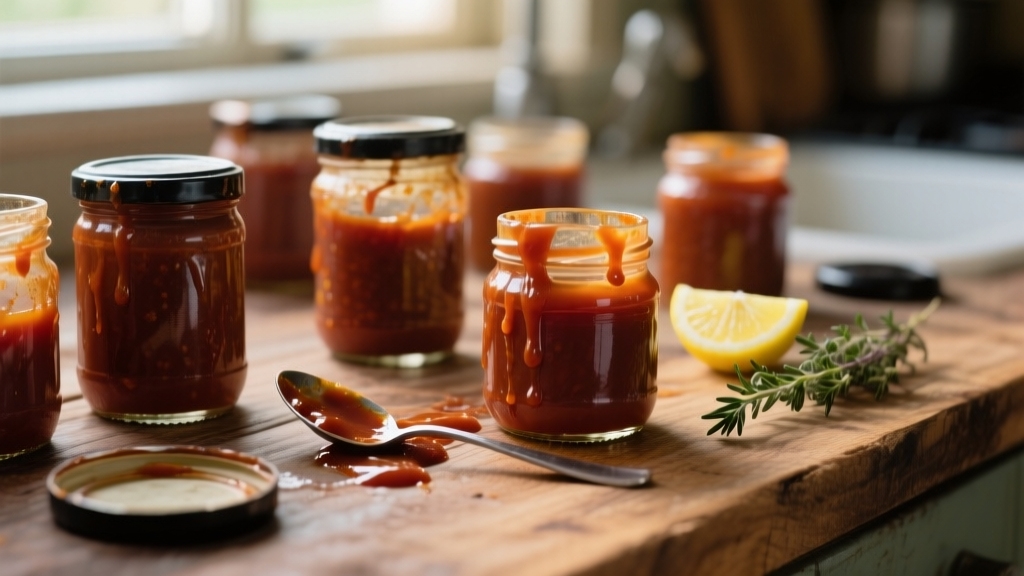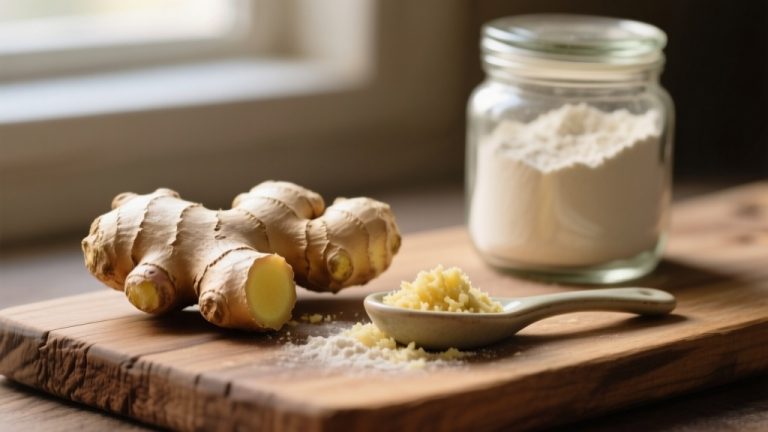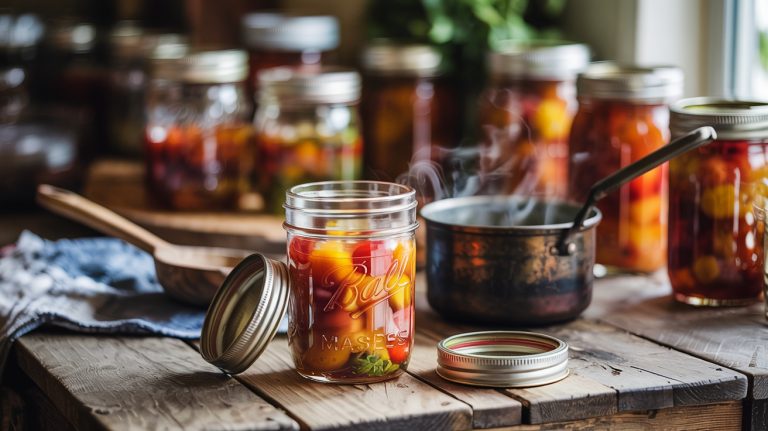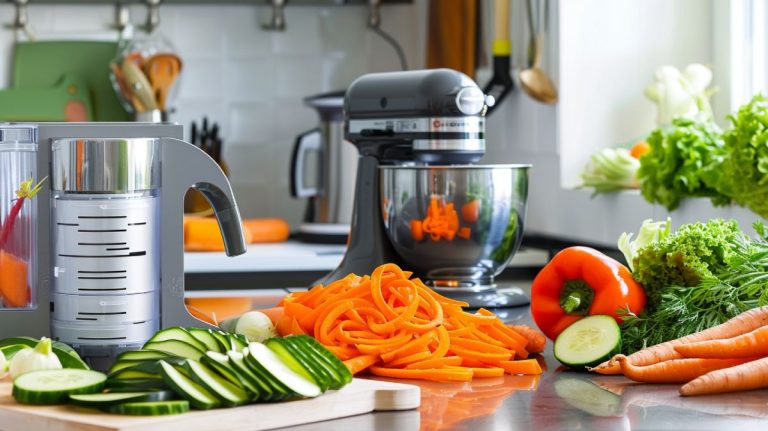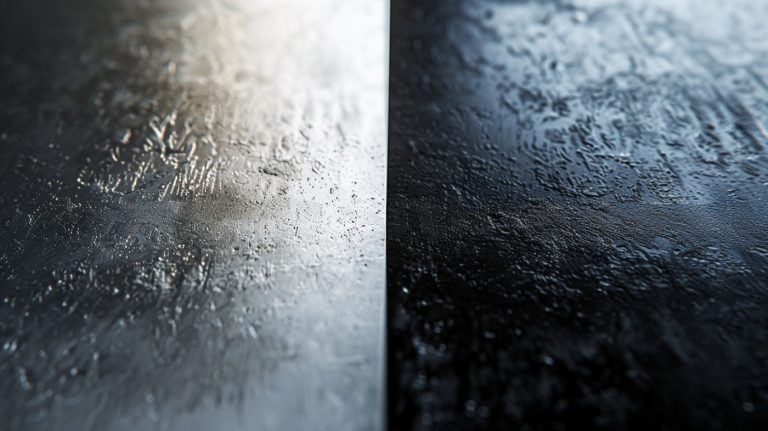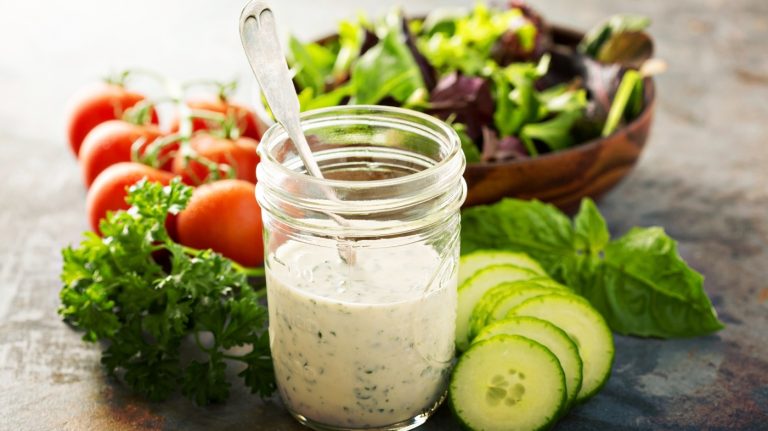Does BBQ Sauce Go Bad? Shelf Life and Storage Tips
Yes, BBQ sauce does go bad, especially once opened. Commercially prepared sauces last about 4–6 months refrigerated after opening, while homemade versions spoil within 1–2 weeks due to lack of preservatives. Unopened bottles can remain safe up to a year in a cool, dark pantry.
Spoilage shows as mold, off smells, or texture changes. Proper storage—airtight, refrigerated, or frozen—extends usability. Understanding factors influencing shelf life and spoilage signs helps guarantee safety and quality.
Key Takeaways
- Opened BBQ sauce typically lasts 4–6 months refrigerated; homemade varieties spoil within 1–2 weeks.
- Unopened commercial BBQ sauce can remain safe for 6 months to 1 year in a cool, dark pantry.
- Signs of spoilage include mold, off smells, color changes, texture alterations, and sour taste.
- Proper storage involves refrigeration after opening, airtight sealing, and avoiding heat or light exposure.
- Freezing BBQ sauce can extend shelf life up to 3–6 months; thaw in the refrigerator before use.
How Long Does BBQ Sauce Last After Opening?
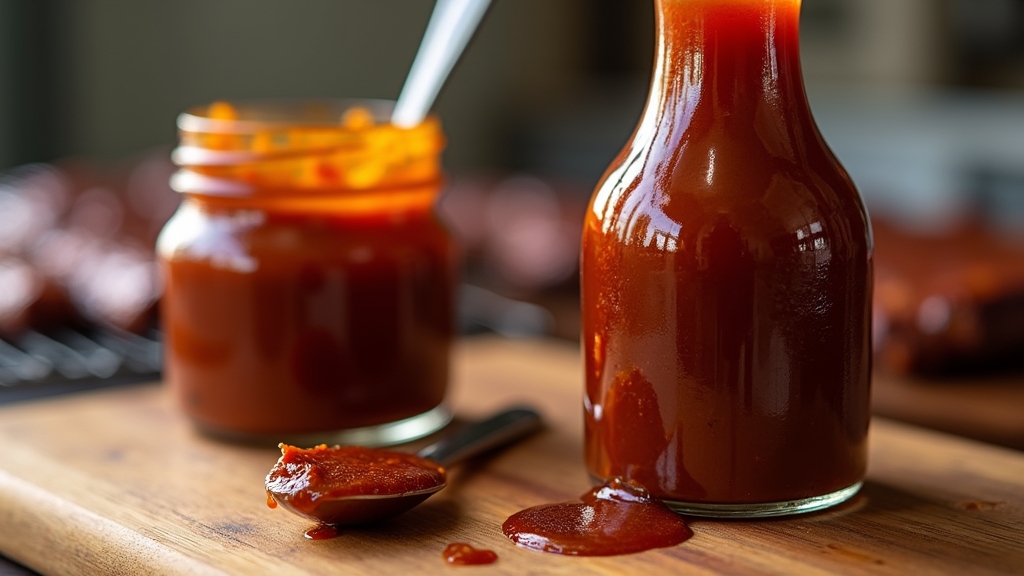
While the exact shelf life varies by formulation and storage, you can generally expect opened commercial BBQ sauce to remain safe and flavorful for 4 to 6 months when refrigerated properly.
This timeframe depends on ingredients like vinegar, sugar, and preservatives, which inhibit microbial growth. Proper refrigeration is essential for maintaining quality and safety of the sauce. Regular temperature monitoring of your refrigerator helps ensure these conditions are consistently met.
Homemade sauces, lacking preservatives, spoil much faster—typically within 1 to 2 weeks. To maximize shelf life, store the sauce immediately in the refrigerator with the lid tightly sealed, use clean utensils, and wipe the bottle rim to prevent mold.
Incorrect refrigeration shortens usability considerably. Some commercial sauces may last up to a year under ideal conditions, but it’s prudent to monitor for spoilage signs such as mold, off smells, or color changes to ensure safety and quality.
Shelf Life of Unopened BBQ Sauce
You can expect unopened BBQ sauce to maintain quality for six months to a year when stored in a cool, dark pantry. Preservation factors like preservatives, packaging integrity, and stable temperature considerably influence this shelf life.
Proper storage minimizes oxidation and microbial growth, extending the sauce’s usability beyond the printed best-by date, similar to how regular maintenance helps in optimal performance of water filters.
Natural ingredients in BBQ sauce degrade over time even when sealed, so natural degradation is inevitable despite careful storage.
Pantry Storage Duration
Although unopened BBQ sauce can remain safe for extended periods when stored correctly, its shelf life in the pantry typically ranges up to one year.
Under ideal conditions—cool, dark, and dry with stable temperatures below room level—store-bought commercial sauces maintain safety and quality for up to 12 to 18 months. The “best by” date serves as a guideline; unopened bottles often remain usable up to a year past this date if packaging integrity is intact.
Factors like preservatives, sugar, and vinegar naturally prolong shelf life. Avoid exposure to light, heat sources, and air infiltration to prevent oxidation and spoilage. Proper storage conditions are critical to prolonging shelf life and maintaining quality.
Homemade sauces generally require refrigeration and differ in storage needs. Regularly inspect bottles for signs of damage or bulging to ensure safe pantry storage duration.
Preservation Factors Unopened
Because unopened BBQ sauce relies heavily on its storage conditions, maintaining an ideal environment is essential to preserving its shelf life.
You should store unopened bottles in a cool, dark, and dry pantry, away from heat sources like stoves or ovens, to prevent temperature fluctuations that accelerate degradation. An intact, airtight seal is critical to minimize oxidation and microbial contamination, preserving quality for up to one year.
Additionally, controlling temperature fluctuations helps maintain the sauce’s flavor and consistency. Commercial sauces with preservatives often remain usable 6–12 months beyond the “best by” date, though flavor and texture may decline.
Homemade sauces lack preservatives and generally require refrigeration even unopened, shortening shelf life. Regularly inspect appearance and smell before use; cloudiness, off-odors, or broken seals indicate spoilage risk. Always check the printed expiration date to ensure the sauce is still safe to consume. Adhering to these factors ensures ideal unopened BBQ sauce preservation.
Differences Between Store-Bought and Homemade BBQ Sauce Shelf Lives
When comparing store-bought and homemade BBQ sauces, their shelf lives differ considerably due to variations in ingredients, preservatives, and storage requirements.
Store-bought sauces contain preservatives like vinegar and sugar, extending refrigerated shelf life to 4–6 months after opening, while homemade sauces last only 1–2 weeks refrigerated, lacking these additives.
It is important to store opened BBQ sauce in the refrigerator with the lid tightly sealed to prevent spoilage and contamination, which helps maintain flavor and safety.
Proper storage also includes avoiding improper storage practices that can accelerate spoilage. Proper storage is key to extending the usability of BBQ sauces.
Unopened store-bought sauces remain stable up to a year at room temperature; homemade sauces require immediate refrigeration.
| Aspect | Store-Bought BBQ Sauce | Homemade BBQ Sauce |
|---|---|---|
| Refrigerated (opened) | 4 to 6 months (up to 1 year) | 1 to 2 weeks |
| Unopened (pantry) | 6 to 12 months | Not recommended |
| Freezing | Rarely necessary | Extends shelf life up to 6 months |
You should prioritize these differences when evaluating sauce longevity.
Best Practices for Storing BBQ Sauce
Understanding the differences in shelf life between store-bought and homemade BBQ sauces helps inform how you should store them to maximize freshness and safety. You must use airtight containers to limit oxygen exposure and bacterial contamination.
Store-bought sauces fare best in their original packaging, while homemade sauces benefit from sealed glass jars with plastic liners. Unopened store-bought BBQ sauce can remain shelf-stable for 12 to 24 months when kept in a cool, dry pantry. Proper storage conditions are crucial to prevent moisture-related spoilage and maintain flavor quality.
Refrigerate sauces immediately after opening, placing them in the coldest fridge area and sealing tightly after each use. Avoid cross-contamination by using clean utensils and promptly closing containers.
Consider freezing tomato-based sauces in portioned containers for up to three months but avoid freezing creamy variants. Store unopened sauce in a cool, dark place away from heat. Minimize air space in containers to reduce oxidation. Label frozen sauces with dates for proper rotation. Thaw frozen sauces in the refrigerator to maintain quality.
Signs That BBQ Sauce Has Spoiled
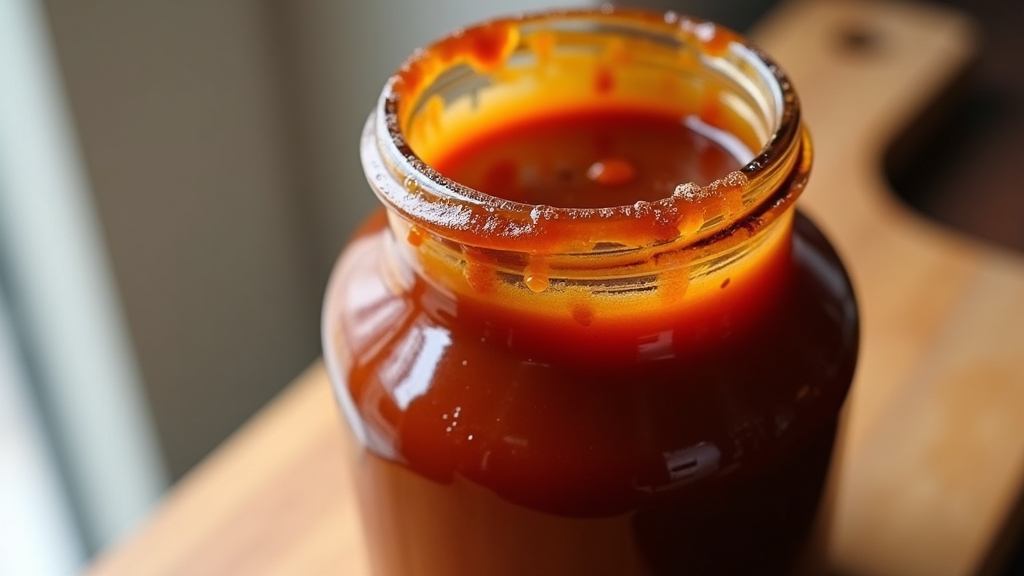
Although BBQ sauce generally has a long shelf life, you need to recognize specific signs that indicate spoilage to guarantee food safety. First, an off-putting smell such as sour, rancid, or chemical odors signals bacterial growth and unsafe consumption. Avoid tasting sauce with suspicious odors.
Recognize off-putting smells like sour or rancid odors as key signs of BBQ sauce spoilage and avoid tasting it.
Visually, watch for darkening color, unusual hues, or mold growth in green, black, or white patches, which require immediate disposal. Texture changes matter too; slimy, clumpy, excessively thick, or thin consistencies indicate microbial activity or oxidation. Proper storage in airtight containers can help delay these changes. Using illuminated cabinet features can help you easily spot any visual spoilage signs in deep or dark kitchen corners.
Persistent liquid separation combined with other signs also warrants caution. Mold presence is critical as it produces harmful toxins—even small patches mean discarding the entire container.
To prevent foodborne illness, always discard sauce when these spoilage indicators appear, ensuring safe consumption and ideal flavor quality.
Impact of Ingredients on BBQ Sauce Longevity
Since the composition of BBQ sauce directly affects its stability, you need to contemplate how ingredients like acidity, sugar, salt, and preservatives influence its longevity.
Acidity lowers pH, inhibiting microbial growth and extending shelf life, especially in vinegar-rich sauces. Using a gravy separator can help remove excess fat from sauces, which might otherwise affect their preservation.
Sugar reduces water activity, limiting spoilage microbes. Salt acts as an antimicrobial agent, further enhancing stability. Artificial preservatives, common in commercial sauces, markedly prolong usability by curbing bacteria and mold.
- High vinegar content increases acidity, preventing spoilage
- Elevated sugar levels reduce water availability for microbes
- Salt presence contributes antimicrobial properties, boosting shelf life
- Synthetic preservatives extend longevity by limiting microbial growth
Proper storage, such as refrigerating opened bottles and keeping caps tightly sealed, is essential to maintain these preservative effects and prolong shelf life.
Variations in Shelf Life by Type of BBQ Sauce
When you consider the type of BBQ sauce, its shelf life can vary considerably based on formulation and storage conditions. Commercial unopened sauces generally last 12 to 24 months when stored in a cool, dark place, with preservatives extending longevity.
For sauces that come in packaging like jars or bottles, ensuring the seal is intact before purchase also helps maintain freshness.
BBQ sauce shelf life varies by type and storage; commercial unopened bottles last 12 to 24 months.
Opened sauces require refrigeration, lasting 4 to 12 months depending on preservative content and acidity. High vinegar or sugar concentrations enhance antimicrobial effects and preservation.
It is important to store opened bottles in the fridge to slow bacterial growth and prolong freshness. Additionally, always check for signs of spoilage such as off smells or mold to avoid consuming spoiled sauce.
In contrast, homemade sauces spoil faster—typically within 1 to 2 weeks refrigerated—due to absence of preservatives and fresher ingredients. Using clean utensils each time you serve can reduce contamination and extend usability.
Specialty artisanal sauces may offer balanced formulations that extend freshness if refrigerated promptly. Their packaging and sealing quality also play a role in shelf life.
Salt content also influences shelf life, with higher levels aiding preservation. Proper storage, sealed containers away from heat and light, is critical across all types to minimize oxidation and microbial growth, thereby maximizing shelf stability.
Using Expired BBQ Sauce Safely
You should evaluate expired BBQ sauce by examining its color, texture, and odor for any signs of spoilage before use. Since BBQ sauce can go bad within 6-9 months depending on storage and type, it is important to check for these indicators.
If the sauce shows no mold, off-smells, or texture changes, it may be safe to consume with caution. Always follow safe storage guidelines and avoid tasting questionable sauce to minimize health risks.
Proper storage extends usability; spoilage signs are key to safe consumption shelf life. Using proper storage techniques can help maintain the sauce’s quality for a longer period.
Assessing Sauce Quality
How can you determine if expired BBQ sauce is still safe to use? First, assess its sensory and physical characteristics precisely. Look for any mold or fuzzy growth, which means discard immediately.
Smell the sauce: sour, fermented, or rancid odors indicate spoilage. Examine the color; significant darkening beyond natural variations is a red flag.
Check texture for slime, clumps, or unusual thickness, signaling degradation. If stains or residue remain on containers, applying effective pre-treatment methods can help prevent contamination.
Since store-bought varieties contain preservatives but still have a limited shelf life of approximately four months after opening, it is important to consider the duration since opening when evaluating safety. limited shelf life
Taste only if other indicators are absent; an off flavor confirms it’s unsafe.
Key points to assess quality:
- Mold or fuzzy growth mandates disposal
- Sour or foul odor signals spoilage
- Noticeable discoloration beyond normal changes
- Texture abnormalities like sliminess or chunkiness
Safe Consumption Practices
After evaluating the sensory and physical indicators of BBQ sauce quality, applying safe consumption practices becomes necessary to minimize health risks. You should refrigerate opened sauces in airtight containers to slow microbial growth, extending safe consumption up to 6 to 9 months.
Avoid sauces left unrefrigerated beyond two hours to prevent bacterial proliferation in the danger zone (40°F–140°F). Before use, inspect for mold, off odors, texture changes like slime or clumps, and discoloration—any of which indicate spoilage and necessitate disposal.
Even vinegar-based sauces spoil eventually, and thermal processing won’t neutralize toxins from mold. When uncertain, discard the sauce; risking foodborne illness outweighs preserving flavor.
Follow manufacturer guidelines strictly to maximize safety and refresh your BBQ experience with fresh sauce rather than relying on expired products.
Tips for Extending the Freshness of BBQ Sauce
Although BBQ sauce contains preservatives, its freshness depends heavily on proper storage techniques. To maximize shelf life and maintain quality, you must control temperature, limit air exposure, and prevent contamination.
Follow these tips to extend your BBQ sauce’s usability:
Follow these simple steps to keep your BBQ sauce fresh and flavorful longer.
- Refrigerate immediately after opening; store in the coldest fridge area to minimize temperature fluctuations. Most commercial sauces stay good for 1–2 months refrigerated, significantly extending usability after opening.
- Use airtight containers or tightly reseal original bottles to reduce oxidation and bacterial growth.
- Avoid double-dipping utensils to prevent introducing microbes that accelerate spoilage.
- Freeze excess sauce in vacuum-sealed bags for 3–6 months. Flatten bags for even freezing and space efficiency.
Frequently Asked Questions
Can BBQ Sauce Be Used as a Marinade Safely After Opening?
Yes, you can safely use BBQ sauce as a marinade after opening if you refrigerate it promptly and use it within 4 to 6 months. Keep it cold during marinating to prevent bacterial growth, and never leave it at room temperature beyond two hours.
If the sauce contacted raw meat, boil or discard it to avoid contamination. Always check for spoilage signs like mold, off odors, or texture changes before use.
Does Freezing BBQ Sauce Affect Its Flavor or Texture?
You might think freezing BBQ sauce locks in its original flavor and texture perfectly, but it actually causes subtle changes. Freezing alters ingredient interactions, slightly shifting flavors due to sugar and acid effects.
Texture can thicken or separate as water and oil parts react differently. Still, if you freeze it rapidly and thaw it slowly, you’ll preserve quality well. Just avoid long storage or refreezing to keep taste and consistency intact.
Are There Any Health Risks From Eating BBQ Sauce Past Its Best-By Date?
Yes, eating BBQ sauce past its best-by date can pose health risks if spoilage signs are present. Harmful bacteria like Salmonella may develop, causing nausea, vomiting, or diarrhea. Mold growth can produce mycotoxins, leading to allergic reactions or toxicity.
Even without visible spoilage, prolonged storage increases microbial growth risk. Always inspect for off smells, discoloration, or texture changes, and discard the sauce if any abnormalities exist to avoid foodborne illness.
How Do Preservatives in BBQ Sauce Impact Its Nutritional Value?
Preservatives in BBQ sauce don’t substantially alter its core nutritional value like calories or macros, but they can affect how you perceive its healthfulness. Chemical preservatives may introduce trace residues, while overuse can cause off-flavors that mask natural taste.
Additionally, high sugar and sodium levels often present alongside preservatives contribute more to nutritional concerns. So, while preservation extends shelf life, it indirectly impacts your nutritional intake through associated additives and flavor changes.
Can BBQ Sauce Cause Allergic Reactions if Stored Improperly?
Yes, BBQ sauce can cause allergic reactions if stored improperly. When left unrefrigerated or past its shelf life, microbial growth alters allergenic proteins, increasing their potency.
Mold and bacteria can produce mycotoxins and endotoxins, aggravating immune responses.
Cross-contamination during poor storage may introduce undeclared allergens. You should always refrigerate BBQ sauce promptly and inspect for spoilage signs to minimize these risks and assure allergen stability and safety.
Stay Safe and Flavorful: Recognize When BBQ Sauce Goes Bad
You might think BBQ sauce lasts forever, given its sugary, acidic armor—but it doesn’t. Even that stubborn bottle in your fridge eventually surrenders to time and spoilage.
So, don’t wait for the unmistakable funk or mold to remind you it’s gone bad. Store it properly, check ingredients, and trust your senses. After all, there’s no glory in risking your meal’s flavor or your health just to salvage a few last drips.

